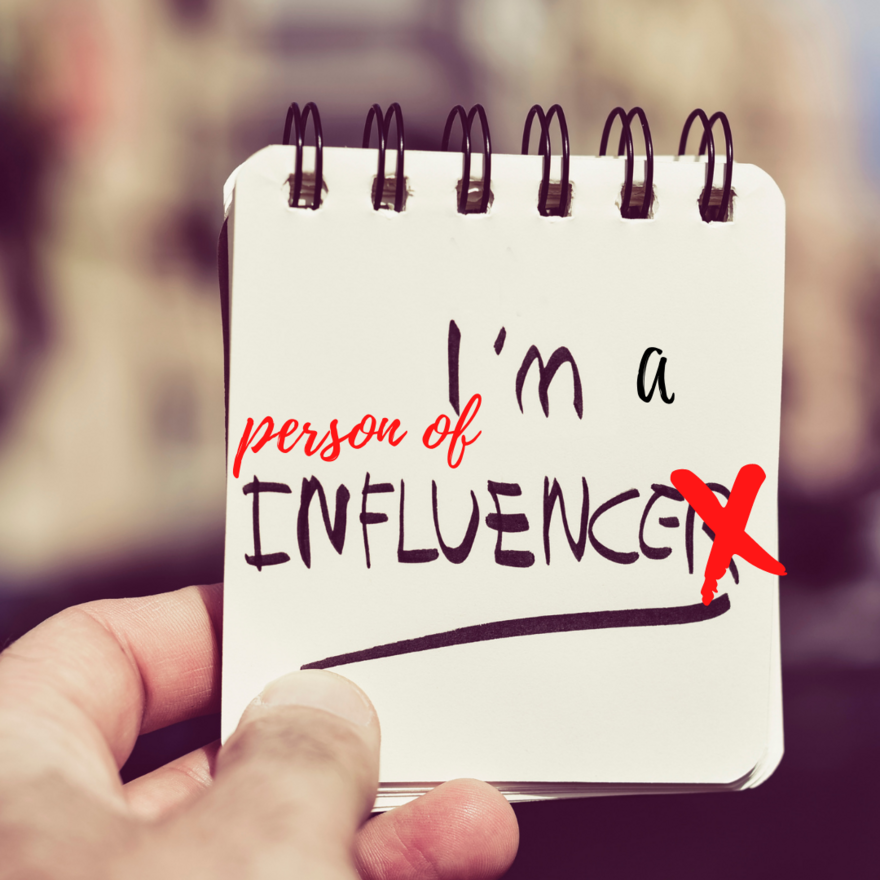5 Influence Strategies to Know & Use: For your business and as a consumer

What is influence? Today we may think of an “online influencer” when we hear the word. That’s not the type of influence I’m talking about.
I’m talking about becoming a person of influence – someone who has 360-degrees of communication confidence, is thought of as powerful (in the best light) and has a strong personal brand. Being a person of influence is someone who:
- Motivates people to take action
- Inspires people to join a cause or movement
- Is listened to, heard, respected
- Ensures accountability
- Gets others on board with their vision
…and uses their skills and yes, some strategies, with a positive intention.
The intention matters. For example, if I know that my services will help people (and I do) then I have no qualms about influencing their decision, so they move forward with their goals and get the results they so desire.
When we understand how human psychology and behavior works, we can do that and still feel good about using the strategies of influence.
Here are a few influence principles that have been used for decades (or longer). Think about how you might implement them in your brand or business now. And as a consumer, how they might make you more informed and aware.
- Scarcity – We want more of what we can’t have. Think of how many times you’ve made a purchasing decision because of a special offer or looming price increase. Urgency inspires action.
- For business – As the old adage goes, the only constant is change. I know I’ve rolled out programs to experiment and then eliminated them. So, the limited time offer is true, and it helps get people to “yes.” No action means no change. After all, you have a product or service that will help and provide value and there are no guarantees things stay available forever. That’s why favorite make up is forever discontinued!
- As a consumer – Just like kids, adults don’t like to be told what to do. In psychology we call it agency. We want to have a choice. Jack Brehm called this Reactance Theory which is all about the human response to diminishing personal control. He reasoned that people are motivated to rebel against forced decisions especially if it’s less than what you had before. This is why if you provide a gym membership with towel service included only to remove the towel privilege, you’ll have some unhappy members. It’s not the towel so much, but the access.
- Authority – People follow the lead of credible, knowledgeable experts.
- For business – You must create a strong brand to show your authority. Sure, credentials are great, but what’s your story? How did you get into this line of work? What’s been your experience? What struggle have you overcome? Experiment – write, create video – it helps you connect and display your authority.
- As a consumer – That’s an actor/model in that ad and you know it. He’s not really a doctor, lawyer, or business owner but you go with it. We allow ourselves to be swayed even when we know it. Get in the practice of asking questions to seek understanding and come from a place of curiosity, versus judgement.
- Commitment and Consistency – People like to be consistent with the things they have previously said or done. Consistency is activated by looking for, and asking for, small initial commitments before larger commitments.
- For business – We see this all the time with email opt-ins. We ask for permission to get someone’s email address in exchange for something of value. Later, if they choose to sign up, they’ll be offered other items for sale.
- As a consumer – Every time you agree to a small action, know that there may (likely) be a bigger ask behind it. It’s not someone trying to pull the wool over your eyes (necessarily), nevertheless it’s how influence and persuasion work.
- Reciprocity – People feel obligated to give back after receiving a favor, gift, or service. This principle works best when you are able to give first and the “gift” is both personalized and unexpected.
- For business – At our family business, my mom loves to give free mini candles to customers unexpectedly. She’s not doing it in hopes that they buy more, but rather because she’s generous and enjoys making them smile. The upside, however, is it builds a relationship and they come back because of the generosity.
- As a consumer – Many times we get excited when we see “FREE” this or that. It’s good to know that a little free value is likely influencing your future decisions.
- Liking – People prefer to say yes to those that they like. So how do you become likeable? Persuasion science reveals there are three important factors: similarity, those who compliment and those cooperative toward mutual goals.
- Application in business – Any good salesperson will tell you to find commonality between you and your customers. You’re from Iowa? Me too! You like the beach? Me too! It sounds ridiculously simple, but it makes you more likeable (if it’s authentic, of course).
- As a consumer – When it’s inauthentic and the salesperson is telling you things you know aren’t true, you can feel it. It’s like a sixth sense. Being authentic is critically important when it comes to likeability.
Influence and persuasion have been used in communication since the days of Aristotle so it’s not surprising a method exists. I see influence as communication with results and it’s what all business owners and entrepreneurs really want, which is why I created the UpLevel Your Influence Program for your brand and business. To ensure you find out about launch-level offers, sign up here: https://www.uplevelc.com/program
BOOK INSPIRATION:
I was inspired to write theis blog after reading the book Influence: The Art of Persuasion by Robert Cialdini. These concepts and more will be a part of my course/coaching hybrid program.

0 comments
Leave a comment
Please log in or register to post a comment